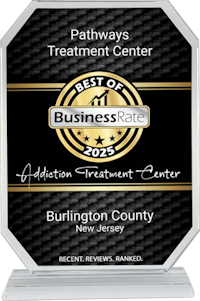Personality Disorders and Addiction Treatment in Burlington, New Jersey
Personality Disorders and Addiction Treatment in Burlington, New Jersey
What is Dual Diagnosis?
Dual diagnosis, also known as co-occurring disorders, refers to the simultaneous occurrence of a mental health disorder and a substance use disorder in an individual. This condition is complex because the two disorders often interact, making each one harder to treat.
For individuals with personality disorders, dual diagnosis treatment is essential. Both conditions impact behavior, emotions, and relationships, leading to a unique set of challenges. The goal of dual diagnosis treatment is to provide comprehensive care that addresses both mental health and substance use concerns to support long-term recovery and overall well-being.
Personality Disorders and Addiction Treatment in Burlington, New Jersey
Understanding Personality Disorders
Personality disorders are mental disorders characterized by persistent patterns of thinking, feeling, and behaving that deviate from cultural expectations and cause significant distress or impairment to the individual. These disorders often influence how individuals perceive themselves and others, making it difficult for them to maintain healthy relationships or cope with everyday stressors. Personality disorders can vary widely, but many share common traits like emotional instability, impulsive behavior, and difficulty forming attachments.
Personality Disorders and Addiction Treatment in Burlington, New Jersey
Causes and Risk Factors for Personality Disorders
Personality disorders are complex conditions influenced by a combination of genetic, environmental, and psychological factors. While the exact causes are not fully understood, several risk factors have been identified that may contribute to their development. Genetics play a significant role, as a family history of mental health disorders can increase the likelihood of developing a personality disorder.
Childhood trauma, including physical or emotional abuse, neglect, or loss, is another critical factor. Brain chemistry, particularly imbalances in neurotransmitters such as serotonin and dopamine, can also contribute to the development of these disorders. Environmental factors, such as social and cultural influences, stress, and adversity, further shape an individual’s personality and behavior. Understanding these risk factors is essential for early identification and intervention.

Personality Disorders and Addiction Treatment in Burlington, New Jersey
Types of Personality Disorders Common in Dual Diagnosis
While any personality disorder can coexist with substance use disorder, certain types are more frequently seen in dual diagnosis cases:
- Bipolar Disorder: Marked by intense emotional swings and impulsive behavior, individuals with bipolar disorder may turn to drugs or alcohol to self-medicate. Up to 60% of individuals with bipolar disorder may also cope with substance abuse.
- Antisocial Personality Disorder (ASPD): Those with ASPD exhibit disregard for others, impulsivity, and a lack of empathy. Substance use is often a way to seek thrills or escape consequences of their behavior.
- Narcissistic Personality Disorder (NPD): Individuals with NPD have a deep need for admiration and often struggle with feelings of inadequacy. Substance use can be a coping mechanism for their insecurities.
- Avoidant Personality Disorder: Characterized by extreme social inhibition and feelings of inadequacy, those with this disorder might use substances to feel more comfortable in social settings.
- Dependent Personality Disorder: Individuals with this disorder are heavily reliant on others for care and decision-making. This reliance can be exacerbated by issues like alcoholism, creating a cycle of dependency and substance abuse.
- Histrionic Personality Disorder: Marked by attention-seeking and dramatic behaviors, addiction to drugs or alcohol may exacerbate these tendencies.
- Obsessive-Compulsive Personality Disorder (OCPD): Unlike obsessive-compulsive disorder (OCD), OCPD is characterized by a preoccupation with orderliness, control, and perfectionism. Those with OCPD might struggle with substance abuse if they feel overwhelmed.
Personality Disorders and Addiction Treatment in Burlington, New Jersey
How Personality Disorders Impact Substance Use
The symptoms of personality disorders can make individuals vulnerable to substance use as a coping strategy. For example:
- Emotional Regulation: Many individuals with personality disorders struggle to regulate emotions, leading to substance use as a form of relief.
- Social Difficulties: Personality disorders often affect relationships, resulting in social isolation or conflict that individuals may try to escape through substance use.
- Impulsivity: Disorders like BPD and ASPD are associated with impulsive behavior, increasing the likelihood of experimenting with drugs or alcohol.
Personality Disorders and Addiction Treatment in Burlington, New Jersey
The Link Between Mental Health and Substance Abuse
Mental health and substance abuse are intricately linked, with each condition influencing the other. For individuals with personality disorders, the connection can be particularly strong due to the emotional and behavioral challenges these disorders bring. Substance use can temporarily alleviate symptoms like anxiety or mood swings. But it often worsens the person’s ability to cope in the long run, creating a cycle of addiction that becomes hard to break without integrated treatment.

Personality Disorders and Addiction Treatment in Burlington, New Jersey
Challenges in Diagnosing Personality Disorders with
Diagnosing personality disorders in individuals who also struggle with substance use can be challenging. Substance use can mask or mimic symptoms of personality disorders, making it difficult for clinicians to determine the true nature of the disorder. For instance, alcohol withdrawal symptoms can resemble anxiety or mood swings, while chronic fentanyl addiction may exacerbate symptoms like paranoia or aggression. Accurate diagnosis requires a thorough assessment, often involving a period of sobriety to distinguish the underlying personality disorder from the effects of substance use.
Personality Disorders and Addiction Treatment in Burlington, New Jersey
Therapies Used in Dual Diagnosis Treatment for Personality Disorders
Treating dual diagnosis requires a multifaceted approach tailored to address both the personality disorder and substance use disorder simultaneously. Common therapies include:
Particularly effective for BPD, DBT helps individuals manage intense emotions and improve relationships. This can help reduce the likelihood of substance use as a coping mechanism.
CBT helps individuals identify and modify the patterns of thinking and behavior that may contribute to both expressions of their personality disorder and substance use.
This therapy explores unconscious thoughts and past experiences that may contribute to personality disorder symptoms and substance use.
Group therapy sessions provide a supportive environment where individuals can learn from each other’s experiences and build social skills, which can be especially helpful for those with personality disorders.
Personality Disorders and Addiction Treatment in Burlington, New Jersey
Inpatient vs. Outpatient Treatment for Dual Diagnosis
Choosing between inpatient and outpatient treatment depends on the severity of both the personality disorder and substance use disorder. The individual’s personal circumstances will also make a difference in what choice is most optimal.
- Inpatient Treatment: Provides a structured environment where individuals receive intensive, around-the-clock care. This option is ideal for those with severe dual diagnoses, offering a safe space to undergo therapy without outside stress or triggers.
- Outpatient Treatment: Allows individuals to continue their daily lives while attending therapy sessions. Outpatient treatment is suitable for those with mild to moderate symptoms or who have already completed an inpatient program and are ready for a step-down approach.
A combination of both types of treatment, often starting with inpatient care and transitioning to outpatient, can provide a comprehensive continuum of support.
Personality Disorders and Addiction Treatment in Burlington, New Jersey
Finding Dual Diagnosis Treatment
Finding the right dual diagnosis treatment program is crucial for individuals struggling with both mental health and substance use disorders. The following steps can help in locating specialized care:
- Research: Look for treatment programs that specialize in dual diagnosis treatment. Online resources, reviews, and professional organizations can provide valuable information.
- Referrals: Ask for referrals from healthcare providers, therapists, or support groups. Personal recommendations can lead to reputable programs.
- Accreditation: Ensure the treatment program is accredited by reputable organizations such as the Joint Commission or the Commission on Accreditation of Rehabilitation Facilities (CARF). Accreditation indicates adherence to high standards of care.
- Insurance: Check if the treatment program accepts your health insurance. Understanding your coverage can help manage costs and ensure access to necessary services.
By taking these steps, individuals can find a dual diagnosis treatment program that meets their specific needs and supports their journey to recovery.
Personality Disorders and Addiction Treatment in Burlington, New Jersey
The Role of Family and Social Support in Recovery
Recovery from a dual diagnosis involving a personality disorder and substance use is more achievable with the support of family and friends. Family therapy can help loved ones understand the individual’s challenges and learn how to support their recovery. Support groups, both for families and individuals, provide an additional layer of understanding and encouragement. Social support can also reduce feelings of isolation and offer practical assistance, helping individuals stay motivated and connected to their recovery goals.
Personality Disorders and Addiction Treatment in Burlington, New Jersey
Pathways’ Dual Diagnosis Program for Personality Disorders and Addiction
At Pathways Treatment Center, our dual diagnosis program in Burlington, New Jersey is designed to address the unique needs of individuals struggling with both personality disorders and substance use disorders. Our program provides a tailored approach, utilizing therapies like DBT, CBT, and psychodynamic therapy combined with other modalities to support recovery and long-term health.
Pathways offers multiple outpatient options to ensure that individuals receive the level of care that best suits their needs. Our dedicated team is committed to helping individuals build a foundation for recovery, promoting resilience and lasting well-being.
Contact with Pathways today to learn more about our dual diagnosis program and take the first step toward a brighter, healthier future.



